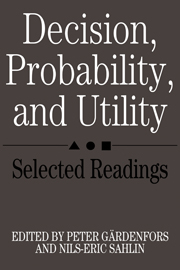Book contents
- Frontmatter
- Contents
- List of contributors
- Preface
- 1 Introduction: Bayesian decision theory – foundations and problems
- Part I Foundations of Bayesian decision theory
- Part II Conceptualization of probability and utility
- Part III Questionable rules of rationality
- 9 Allais' paradox
- 10 Sure-thing doubts
- 11 Prospect theory: An analysis of decision under risk
- 12 Generalized expected utility analysis and the nature of observed violations of the independence axiom
- Part IV Unreliable probabilities
- Part V Causal decision theory
- References
- Name index
- Subject index
12 - Generalized expected utility analysis and the nature of observed violations of the independence axiom
Published online by Cambridge University Press: 05 June 2012
- Frontmatter
- Contents
- List of contributors
- Preface
- 1 Introduction: Bayesian decision theory – foundations and problems
- Part I Foundations of Bayesian decision theory
- Part II Conceptualization of probability and utility
- Part III Questionable rules of rationality
- 9 Allais' paradox
- 10 Sure-thing doubts
- 11 Prospect theory: An analysis of decision under risk
- 12 Generalized expected utility analysis and the nature of observed violations of the independence axiom
- Part IV Unreliable probabilities
- Part V Causal decision theory
- References
- Name index
- Subject index
Summary
Introduction
First expressed by Allais in the early fifties, dissatisfaction with the expected utility model of individual risk taking behavior has mushroomed in recent years, as the number of papers in this volume, its predecessor (Allais & Hagen, 1979), and elsewhere indicates (see, e.g., Chew and MacCrimmon, 1979; Fishburn, 1982b, 1983; Handa, 1977; and Kahneman and Tversky, 1979). The nature of the current debate, i.e. whether to reject a theoretically elegant and heretofore tremendously useful descriptive model in light of accumulating evidence against its underlying assumptions, is a classic one in science, and the spur to new theoretical and empirical research which it is offering cannot help but leave economists, psychologists, and others who study this area with a better understanding of individual behavior toward risk.
In terms of its logical foundations, the expected utility model may be thought of as following from four assumptions concerning the individual's ordering of probability distributions over wealth: completeness (i.e. any two distributions can be compared), transitivity of both strict and weak preference, continuity, and the so-called “independence axiom.” This latter axiom, really the cornerstone of the theory, may be stated as “a risky prospect A is weakly preferred (i.e. preferred or indifferent) to a risky prospect B if and only if a p:(1 – p) chance of A or C respectively is weakly preferred to a p:(1 – p) chance of B or C, for arbitrary positive probability p and risky prospects A, B, and C”.
Information
- Type
- Chapter
- Information
- Decision, Probability and UtilitySelected Readings, pp. 215 - 240Publisher: Cambridge University PressPrint publication year: 1988
Accessibility standard: Unknown
Why this information is here
This section outlines the accessibility features of this content - including support for screen readers, full keyboard navigation and high-contrast display options. This may not be relevant for you.Accessibility Information
- 1
- Cited by
